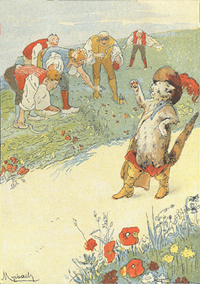January 16, 2015 |
Charles Perrault's Modern Views, 300 Years Later
If Charles Perrault (1628-1703) hadn't been forced into early retirement, the world might never have had Mother Goose, Puss in Boots, Sleeping Beauty, and other memorable fairytale characters. For most of his life, Perrault worked in government service under the protection of Louis XIV's finance minister, Jean-Baptiste Colbert. His reputation as a writer grew throughout his career, and in 1671 he was elected to the Académie Française, France's leading literary institution. He wrote odes and speeches praising King Louis XIV for his artistic patronage and promoted the importance of literature and art in a civilized society. In a 1687 dialogue called Parallèles des anciens et des modernes (Parallels between the Ancients and the Moderns) Perrault lambasts ancient writers like Homer and Aristotle as childish and barbaric, and lauds humanity's progress. This piece was actually part of a much larger debate on scholarship and literary criticism between Perrault and other members of the Académie, polarizing the group and shocking the academic community. Hostilities raged until 1694 when Perrault publicly reconciled with Nicolas Boileau, the leader of the Ancients faction.

Français : Illustration issue de Le Maître chat ou le Chat botté de Charles Perrault en 1885 (Photo credit: Wikipedia)
When Colbert died in 1683, Perrault was quickly dismissed from his government position by jealous rivals. Left alone to care for four children (Perrault's wife had died in 1678), he spent his days writing the Contes du temps passé to entertain and educate his youngest son, Pierre. Eight stories in all, they include "Little Red Riding Hood," "Cinderella" "Little Thumbling" and were published in 1697 to an enthusiastic public. Like the Grimm fairy tales, many of these originated as oral tales, but Perrault polished them into literary gems that still influence children's sensibilities as well as Disney blockbusters. Interestingly, the Contes advances Perrault's position that modernity trumps antiquity, since he argued that his stories teach morality better than ancient fables. Three hundred years later, and on the eve of Perrault's 387th birthday, Perrault's campaign has stood the test of time.















